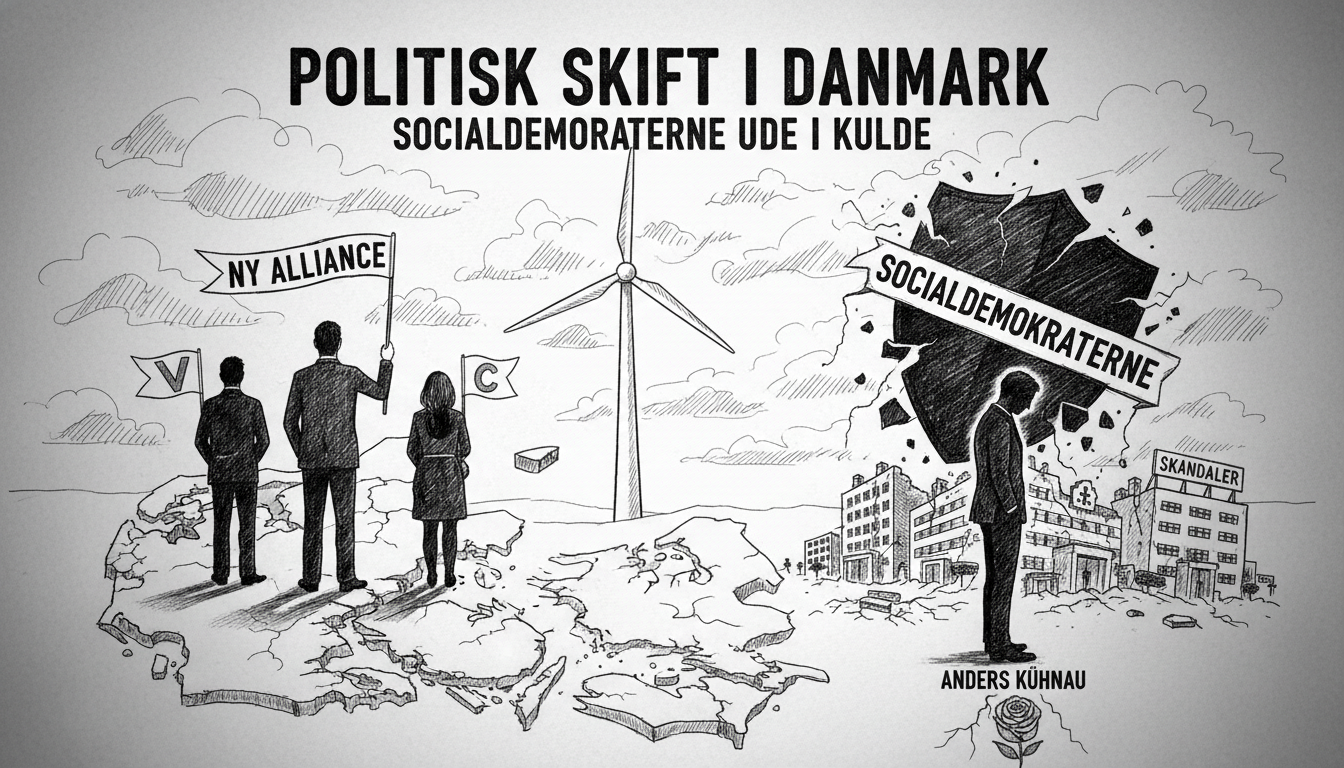At 5:53 AM, a weary Anders Kühnau from the Social Democrats descended the stairs of the regional government building in Viborg and faced his political defeat. The former regional council chairman, who had held power in Central Denmark Region since 2018, acknowledged the new reality.
"There is a majority behind Anders G. Christensen, and we were offered minor positions, but nothing that gives us the influence we should have with our ten mandates," Kühnau stated. He nodded toward representatives from the Red-Green Alliance and the Psychiatry List, who each gained one seat in the new regional council.
To achieve a majority in the Central Denmark Regional Council, a coalition needs 16 mandates. Kühnau could have reached this number if he had maintained support from the Socialist People's Party and the Social Liberals, as happened after the 2021 regional election. But the Social Liberals had different plans on election night, deciding to switch sides and support Anders G. Christensen alongside other center-right parties. Later, when the blue majority was secured, the Socialist People's Party joined negotiations.
Hanne Roed from the Social Liberals explained the rationale behind the political shift. "We need change," she stated, emphasizing the need for greater involvement. "We've seen one scandal after another. Each time, we stood speechless in the regional council, only to discover later that warnings had been sent through the system."
The regional politician referenced several healthcare scandals that rocked public confidence. These included the cancer case from Aarhus University Hospital, where doctors sent warnings about life-threatening conditions for cancer patients in the gastrointestinal surgery department through the region's whistleblower system. Another case involved leg amputations that might have been preventable.
"There is political responsibility, but it doesn't seem like there was any intention to properly clean up so it doesn't happen again," Roed asserted. When questioned about her own party's responsibility as part of the previous council, she responded, "It was really difficult for us because we weren't informed. That was the big problem. Then we could have covered it politically. During the cancer case, we were informed verbally and suddenly had to take a position shortly after. That's no way to do it. It's that culture we need to change."
The new coalition agreement notably emphasizes creating a "new political culture" and "common values." The document states the regional council commits to "a cooperative political culture where all parties have real influence. Criticism should be used constructively as a basis for learning, and disagreements should be handled with respect."
Anders Kühnau dismissed the Social Liberals' criticism as "misguided." Regarding the leg amputation case, he stressed that Central Denmark Region initiated its own investigation voluntarily. "It turned out we were in the middle of the field and no worse than others. We learned from that case, and in Viborg we did better to avoid leg amputations afterward. It was our own curiosity that lifted the veil on it," said Kühnau, who received the most personal votes in the regional election with 38,091 ballots.
Regarding the cancer case, he agreed that information should have reached regional politicians much earlier. "We didn't get the information, not even me. It hits me, but also the regional council. This is the only case that shows we didn't get information in time. But afterward, we initiated much in terms of creating more involvement and inclusion of politicians. It has been taken seriously," Kühnau explained.
Hanne Roed maintained her criticism about the lack of inclusion. "I can state that these cases have occurred. And the psychiatry case from Randers came after the cancer case and leg amputation case. There may have been initiatives started by Anders Kühnau, but they don't seem to have had much effect. And I don't think the regional council has been involved much more closely. There was opportunity to do so," she said.
Kühnau expressed conviction that the Social Liberals had decided to switch sides and support Anders G. Christensen even before election night. "I also invited Hanne Roed for coffee before the election, but she arrived 40 minutes late, and we had to go to a debate. I reached out for broad cooperation, but no one wanted it," said Kühnau, who also loses his powerful position as chairman of Danish Regions.
Roed made no secret of her clear goal to change the political landscape. "I understand Anders Kühnau's frustrations, but I have taken responsibility to ensure a better cooperation climate and work environment. Information about problems at hospitals must come forward more quickly for political treatment," she stated.
Jacob Klærke from the Socialist People's Party explained his decision to accept an outstretched hand from Anders G. Christensen late on election night when it became clear the majority would be center-right. "Our approach is that if someone extends a hand, we accept it if we can see ourselves in it. We can in the political sphere. And I also believe we have good dialogue regarding distributing positions. We're playing along instead of sitting on the bench," he said, highlighting that the coalition agreement focuses on psychiatry, dementia assessment, socially vulnerable groups, and more community nurses.
The Social Democrats in Central Denmark Region must decide whether to join the coalition agreement. "We're considering it," said Kühnau, though he expressed little enthusiasm for the offered positions given that his party holds the most mandates in the new regional council with eight seats. "We were only offered a second vice-chair position in the regional council, the chairmanship of the committee for regional development, and a vice-chair position in a health council," he revealed.
This political realignment reflects broader trends in Danish regional politics where healthcare scandals have eroded public trust. The Central Denmark Region case demonstrates how management of critical health services can directly impact political fortunes and coalition dynamics. The outcome suggests voters and political partners are demanding greater transparency and accountability in healthcare governance, a concern that extends beyond regional borders to national health systems across Scandinavia.

